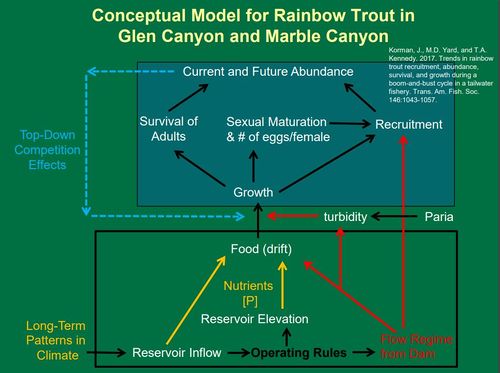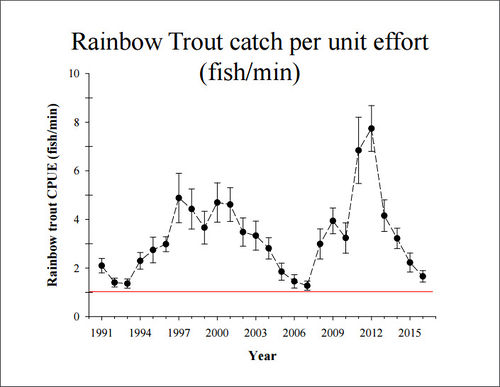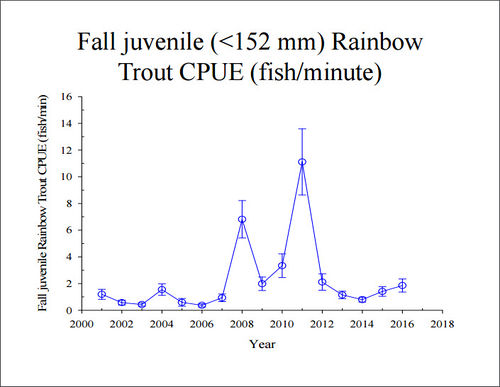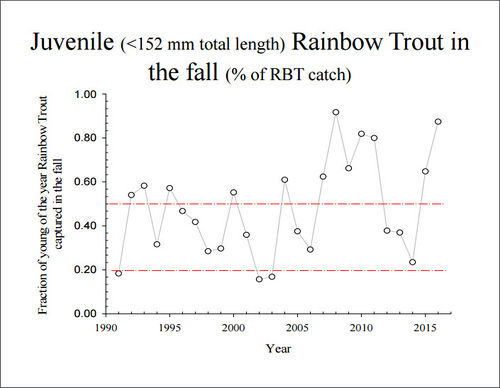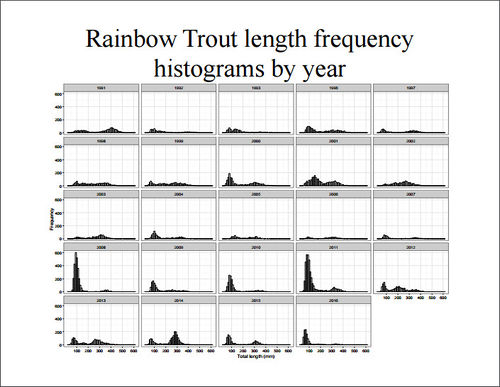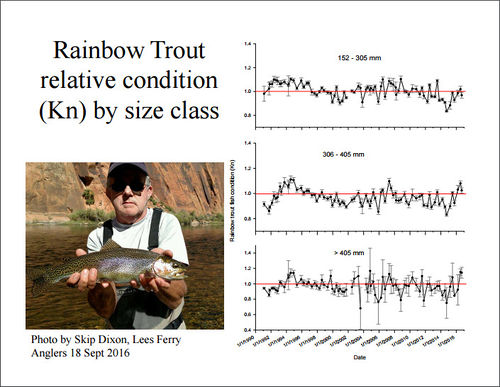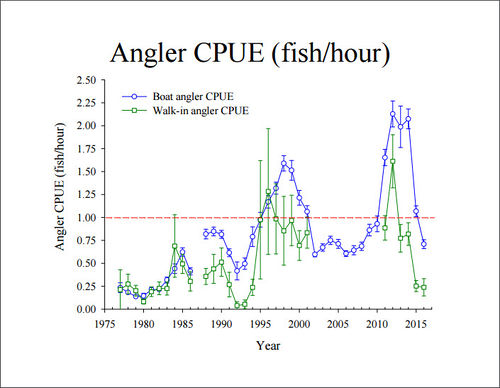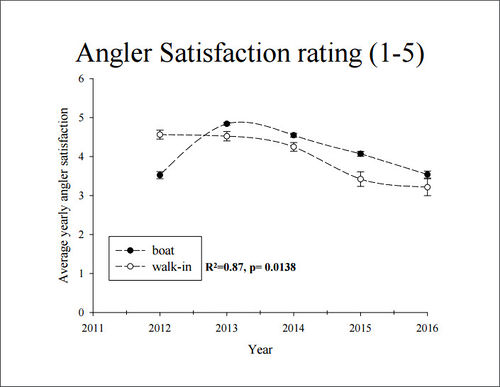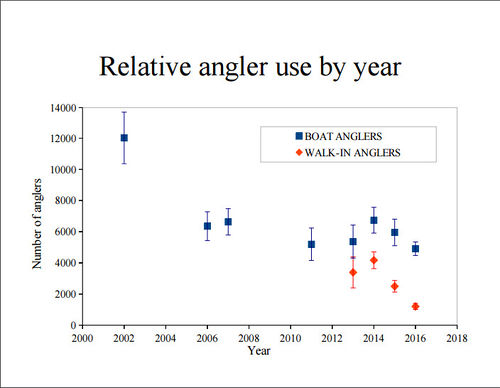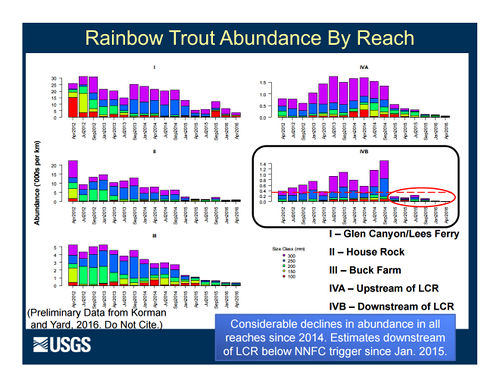Difference between revisions of "FISHERY"
Cellsworth (Talk | contribs) |
Cellsworth (Talk | contribs) |
||
| (169 intermediate revisions by the same user not shown) | |||
| Line 15: | Line 15: | ||
</td> | </td> | ||
</tr> | </tr> | ||
| − | [[File: | + | [[File:RainbowTroutModel.JPG|center|500px|thumbnail|https://www.usbr.gov/uc/progact/amp/twg/2018-01-25-twg-meeting/AR12.pdf ]] |
</table> | </table> | ||
| Line 22: | Line 22: | ||
------------Portal list on righthand side----------> | ------------Portal list on righthand side----------> | ||
|style="width:60%; font-size:120%;"| | |style="width:60%; font-size:120%;"| | ||
| + | |||
| + | =='''The Lees Ferry Rainbow Trout Fishery'''== | ||
In 1964, the Lees Ferry tailrace on the Colorado River was given birth by the completion of Glen Canyon Dam, which impounded Lake Powell. Subsequent water releases from the bottom of Lake Powell changed the once highly turbid, warm waters of the Colorado River into a constant cold (46-50°F), clear flowing river. Shortly after completion of the dam, the Arizona Game and Fish Department stocked rainbow trout (''Oncorhynchus mykiss'') in the 15-mile Lees Ferry reach and, in 1981, began to manage this section of river as a Blue Ribbon rainbow trout fishery. The trout began to flourish in the Lees Ferry reach from 1970-1985 when catches of rainbow trout above 10-pounds were not uncommon, and angler pressure was relatively low. In 1991, however, the Bureau of Reclamation implemented the Record of Decision flow regime, which consisted of higher minimum and more stable flows and allowed for increased trout reproduction and survival. Under these conditions, a huge population of trout developed causing individual fish growth rates to decline. Quite simply, there was a large number of fish competing for limited space and food items, resulting in a fishery where trout less than 14-in were dominant. | In 1964, the Lees Ferry tailrace on the Colorado River was given birth by the completion of Glen Canyon Dam, which impounded Lake Powell. Subsequent water releases from the bottom of Lake Powell changed the once highly turbid, warm waters of the Colorado River into a constant cold (46-50°F), clear flowing river. Shortly after completion of the dam, the Arizona Game and Fish Department stocked rainbow trout (''Oncorhynchus mykiss'') in the 15-mile Lees Ferry reach and, in 1981, began to manage this section of river as a Blue Ribbon rainbow trout fishery. The trout began to flourish in the Lees Ferry reach from 1970-1985 when catches of rainbow trout above 10-pounds were not uncommon, and angler pressure was relatively low. In 1991, however, the Bureau of Reclamation implemented the Record of Decision flow regime, which consisted of higher minimum and more stable flows and allowed for increased trout reproduction and survival. Under these conditions, a huge population of trout developed causing individual fish growth rates to decline. Quite simply, there was a large number of fish competing for limited space and food items, resulting in a fishery where trout less than 14-in were dominant. | ||
In 2000, the [http://www.azgfd.gov/w_c/research_managing_lees_ferry.shtml| Arizona Game and Fish Department] began a long-term monitoring program sponsored by [http://www.gcmrc.gov/| Grand Canyon Monitoring and Research Center] to determine the effects of Glen Canyon Dam operation on the trout fishery at Lees Ferry and to make recommendations for improving this fishery. Since 2000, our data collection has shown an increase in the general health of all trout age classes (especially since 2002). This increase in fish health is usually associated with an increase in growth rates. There has been a marked increase in catch rates of young-of-the-year fish in recent years. With successful spawning and recruitment continuing to occur, fishing conditions in Lees Ferry are improving. [http://www.azgfd.gov/w_c/research_managing_lees_ferry.shtml] | In 2000, the [http://www.azgfd.gov/w_c/research_managing_lees_ferry.shtml| Arizona Game and Fish Department] began a long-term monitoring program sponsored by [http://www.gcmrc.gov/| Grand Canyon Monitoring and Research Center] to determine the effects of Glen Canyon Dam operation on the trout fishery at Lees Ferry and to make recommendations for improving this fishery. Since 2000, our data collection has shown an increase in the general health of all trout age classes (especially since 2002). This increase in fish health is usually associated with an increase in growth rates. There has been a marked increase in catch rates of young-of-the-year fish in recent years. With successful spawning and recruitment continuing to occur, fishing conditions in Lees Ferry are improving. [http://www.azgfd.gov/w_c/research_managing_lees_ferry.shtml] | ||
| + | |||
| + | ==[http://gcdamp.com/index.php?title=Long-term_Experimental_and_Management_Plan_(LTEMP) '''LTEMP Resource Goal for the Rainbow Trout Fishery''']== | ||
| + | Achieve a healthy high-quality recreational rainbow | ||
| + | trout fishery in GCNRA and reduce or eliminate downstream trout migration | ||
| + | consistent with NPS fish management and ESA compliance. | ||
| + | |||
| + | ==[http://gcdamp.com/index.php?title=Portal:Desired_Future_Conditions_-DFCs '''Desired Future Condition for the Lees Ferry Trout Fishery''']== | ||
| + | A high quality trout fishery in GCNRA, as further described in the Recreation DFC that does not adversely affect the native aquatic community in GCNP.<br> | ||
| + | • Minimize emigration of non-native fish from the Lees Ferry reach in Glen Canyon National Recreation Area to downstream locations.<br> | ||
| + | • Minimize emigration of non-native warm water fish to the mainstem Colorado River.<br> | ||
|}<!-- | |}<!-- | ||
| Line 31: | Line 43: | ||
----------Strapline immediately below banner----------> | ----------Strapline immediately below banner----------> | ||
{| style="width:100%; height:50px" border=1px solid #ccc; background:#cedff2 | {| style="width:100%; height:50px" border=1px solid #ccc; background:#cedff2 | ||
| − | ! style="width=50%; background:#cedff2;" | [ | + | ! style="width=50%; background:#cedff2;" | [https://www.azgfd.com/fishing/species/rainbowtrout/ Rainbow Trout] |
| − | ! style="width=50%; background:#cedff2;" | [ | + | ! style="width=50%; background:#cedff2;" | [https://www.azgfd.com/fishing/species/browntrout/ Brown Trout] |
|} | |} | ||
| Line 42: | Line 54: | ||
|style="color:#000;"| | |style="color:#000;"| | ||
| − | [[File: | + | [[File:RT_cpue_2016.jpg |thumb|center|500px|[https://www.usbr.gov/uc/progact/amp/twg/2017-01-26-twg-meeting/AR14_Rogowski.pdf https://www.usbr.gov/uc/progact/amp/twg/2017-01-26-twg-meeting/AR14_Rogowski.pdf] ]] |
| + | [[File:RTjuvi_cpue_2016b.jpg |thumb|center|500px|[https://www.usbr.gov/uc/progact/amp/twg/2017-01-26-twg-meeting/AR14_Rogowski.pdf https://www.usbr.gov/uc/progact/amp/twg/2017-01-26-twg-meeting/AR14_Rogowski.pdf] ]] | ||
| + | [[File:RTjuvi_cpue_2016.jpg |thumb|center|500px|[https://www.usbr.gov/uc/progact/amp/twg/2017-01-26-twg-meeting/AR14_Rogowski.pdf https://www.usbr.gov/uc/progact/amp/twg/2017-01-26-twg-meeting/AR14_Rogowski.pdf] ]] | ||
| + | [[File:RT_LFreq_2016.jpg |thumb|center|500px|[https://www.usbr.gov/uc/progact/amp/twg/2017-01-26-twg-meeting/AR14_Rogowski.pdf https://www.usbr.gov/uc/progact/amp/twg/2017-01-26-twg-meeting/AR14_Rogowski.pdf] ]] | ||
| + | [[File:RT_condition_2016.jpg |thumb|center|500px|[https://www.usbr.gov/uc/progact/amp/twg/2017-01-26-twg-meeting/AR14_Rogowski.pdf https://www.usbr.gov/uc/progact/amp/twg/2017-01-26-twg-meeting/AR14_Rogowski.pdf] ]] | ||
| + | [[File:RT_Anglercpue_2016.jpg |thumb|center|500px|[https://www.usbr.gov/uc/progact/amp/twg/2017-01-26-twg-meeting/AR14_Rogowski.pdf https://www.usbr.gov/uc/progact/amp/twg/2017-01-26-twg-meeting/AR14_Rogowski.pdf] ]] | ||
| + | [[File:RT_AnglerSat_2016.jpg |thumb|center|500px|[https://www.usbr.gov/uc/progact/amp/twg/2017-01-26-twg-meeting/AR14_Rogowski.pdf https://www.usbr.gov/uc/progact/amp/twg/2017-01-26-twg-meeting/AR14_Rogowski.pdf] ]] | ||
| + | [[File:RT_AnglerUse_2016.jpg |thumb|center|500px|[https://www.usbr.gov/uc/progact/amp/twg/2017-01-26-twg-meeting/AR14_Rogowski.pdf https://www.usbr.gov/uc/progact/amp/twg/2017-01-26-twg-meeting/AR14_Rogowski.pdf] ]] | ||
| + | [[File:NO TroutAbundances2016.jpg|thumb|center|500px|[https://www.usbr.gov/uc/progact/amp/amwg/2016-08-24-amwg-meeting/Attach_07a.pdf https://www.usbr.gov/uc/progact/amp/amwg/2016-08-24-amwg-meeting/Attach_07a.pdf] ]] | ||
| − | + | |- | |
| + | ! <h2 style="margin:0; background:#cedff2; font-size:120%; font-weight:bold; border:1px solid #a3b0bf; text-align:left; color:#000; padding:0.2em 0.4em;"> 2014 Collapse of the Lees Ferry Rainbow Trout Fishery</h2> | ||
| + | |- | ||
| + | |style="color:#000;"| | ||
| − | + | Data from a large-scale mark-recapture study was used in an open population model to determine the cause for long-term trends in growth and abundance of a Rainbow Trout Oncorhynchus mykiss population in the tailwater of Glen Canyon Dam, AZ. Reduced growth affected multiple life stages and processes causing negative feedbacks that regulated the abundance of the population, including: higher mortality of larger fish; lower rates of recruitment (young of year) in years when growth was reduced; and lower rates of sexual maturation the following year. High and steady flows during spring and summer of 2011 resulted in very large recruitment event. The population declined 10-fold by 2016 due a combination of lower recruitment and reduced survival of larger trout. Survival rates for trout ≥ 225 mm in 2014, 2015, and 2016 were 11%, 21%, and 22% lower than average survival rates between 2012 and 2013, respectively. Abundance at the end of the study would have been three- to five-fold higher had survival rates for larger trout remained at the elevated levels estimated for 2012 and 2013. Growth declined between 2012 and 2014 owing to reduced prey availability, which led to very poor fish condition by fall of 2014 (~0.9-0.95). Poor condition in turn resulted in low survival rates of larger fish during fall of 2014 and winter of 2015, which contributed to the population collapse. In Glen Canyon, large recruitment events driven by high flows can lead to increases in the population that cannot be sustained due to limitations in prey supply. In the absence of being able to regulate prey supply, flows which reduce the probability of large recruitment events can be used to avoid boom-and-bust population cycles. Our study demonstrates that mark-recapture is a very informative approach for understanding the dynamics of tailwater trout populations. [https://pubs.er.usgs.gov/publication/70187999] | |
| − | + | ||
| − | + | ||
| − | + | ||
| − | + | ||
| − | + | ||
| − | + | ||
| − | + | ||
| − | + | ||
| − | + | ||
| − | + | ||
| − | + | ||
| − | + | ||
| − | + | ||
| − | + | ||
| − | + | ||
|} | |} | ||
| − | |||
| − | |||
| − | |||
| − | |||
| − | |||
<!-- | <!-- | ||
| Line 76: | Line 79: | ||
|class="MainPageBG" style="width:45%; border:1px solid #cedff2; background:#f5faff; vertical-align:top;"| | |class="MainPageBG" style="width:45%; border:1px solid #cedff2; background:#f5faff; vertical-align:top;"| | ||
{| width="100%" cellpadding="2" cellspacing="5" style="vertical-align:top; background:#f5faff;" | {| width="100%" cellpadding="2" cellspacing="5" style="vertical-align:top; background:#f5faff;" | ||
| − | ! <h2 style="margin:0; background:#cedff2; font-size:120%; font-weight:bold; border:1px solid #a3b0bf; text-align:left; color:#000; padding:0.2em 0.4em;"> | + | ! <h2 style="margin:0; background:#cedff2; font-size:120%; font-weight:bold; border:1px solid #a3b0bf; text-align:left; color:#000; padding:0.2em 0.4em;">Links and Information</h2> |
|- | |- | ||
|style="color:#000;"| | |style="color:#000;"| | ||
| − | *[ | + | *[http://gcdamp.com/index.php?title=National_Park_Service_Expanded_Non-native_Aquatic_Species_Management_Plan_and_EA 2019 National Park Service Expanded Non-native Aquatic Species Management Plan] |
| − | *[ | + | *[[GCDAMP 2016 Fish PEP| 2016 Fish Protocol Evaluation Panel (PEP)]] |
| − | *[ | + | *[https://fishaz.azgfd.com/wp-content/uploads/2019/09/Copy-of-Lees-ferry-Fisheries-Managment-plan-final.pdf 2015 State of Arizona Lees Ferry Fish Management Plan] |
| − | *[ | + | *[http://gcdamp.com/index.php?title=2013_National_Park_Service_Comprehensive_Fisheries_Management_Plan 2013 National Park Service Comprehensive Fisheries Management Plan] |
| + | *[http://gcdamp.com/index.php?title=Portal:GCDAMP_Knowlege_Assessments GCMRC Annual Reports page] | ||
| + | *[http://leesferry.com/ Lees Ferry Anglers / Cliff Dwellers Lodge] | ||
| + | *[[Media:A local perspective on the Lees Ferry trout fishery.docx| A local perspective on the Lees Ferry trout fishery]] by Terry Gunn, owner of Lees Ferry Anglers and Cliff Dwellers Lodge | ||
*[http://leesferry.com/river-report/?utm_source=+12%2F15%2F14&utm_campaign=Lees+Ferry+Mailing&utm_medium=email: Lees Ferry Fishing Report] | *[http://leesferry.com/river-report/?utm_source=+12%2F15%2F14&utm_campaign=Lees+Ferry+Mailing&utm_medium=email: Lees Ferry Fishing Report] | ||
| − | *[[Trout Management | + | *[http://www.azgfd.gov/w_c/research_managing_lees_ferry.shtml AZGFD: Managing for Blue Ribbon Rainbow Trout at Lee's Ferry] |
| − | *[http://gcdamp.com/index.php?title=FOOD_BASE | + | *[https://drive.google.com/file/d/0BwY-Z2c3NTUGUmxPbko2dm9URms/view GCDAMP: Lees Ferry Recreational Trout Fishery Management Recommendations] |
| + | |||
| + | |- | ||
| + | ! <h2 style="margin:0; background:#cedff2; font-size:120%; font-weight:bold; border:1px solid #a3b0bf; text-align:left; color:#000; padding:0.2em 0.4em;"> Related Pages </h2> | ||
| + | |- | ||
| + | |style="color:#000;"| | ||
| + | |||
| + | *[http://gcdamp.com/index.php?title=GCDAMP_TAHG_Page The Trout Ad Hoc Group Page] | ||
| + | *[http://gcdamp.com/index.php?title=Brown_Trout Brown Trout Page] | ||
| + | *[http://gcdamp.com/index.php?title=Whirling_Disease Whirling Disease Page] | ||
| + | *[http://gcdamp.com/index.php?title=Humpback_Chub_Page Humpback Chub Page] | ||
| + | *[http://gcdamp.com/index.php?title=FOOD_BASE Aquatic Foodbase Page] | ||
| + | *[http://gcdamp.com/index.php?title=WATER_QUALITY Water Quality Page] | ||
| + | *[http://gcdamp.com/index.php?title=Nutrients Nutrients Page] | ||
| + | |||
| + | |- | ||
| + | ! <h2 style="margin:0; background:#cedff2; font-size:120%; font-weight:bold; border:1px solid #a3b0bf; text-align:left; color:#000; padding:0.2em 0.4em;"> Rainbow Trout Projects </h2> | ||
| + | |- | ||
| + | |style="color:#000;"| | ||
| + | |||
| + | *[http://gcdamp.com/index.php?title=Trout_Management_Flows Trout Management Flows (TMFs)] | ||
| + | *Trout Reproductive and Growth Demographics (TRGD) | ||
| + | *[http://gcdamp.com/index.php?title=Natal_Origins_Project_(NO) Natal Origins Project (NO)] | ||
| + | *Spring and Fall Lees Ferry Trout Monitoring and CREEL surveys | ||
| + | *Rainbow Trout Early Life Stage Study (RTELSS) | ||
| + | *[http://gcdamp.com/index.php?title=Rainbow_trout_/_humpback_chub_predation_studies Rainbow trout / humpback chub predation studies] | ||
| + | *[http://gcdamp.com/index.php?title=Trout_Reduction_Efforts Trout Reduction Efforts] | ||
| + | *Trout Stocking: Nov 2018 500 triploids stocked at the walk-in | ||
| + | *[http://gcdamp.com/index.php?title=Bioenergetics_Studies Bioenergetics Studies] | ||
| + | *Rainbow Trout Individual Based Modeling (IBM) | ||
| + | |||
| + | |- | ||
| + | ! <h2 style="margin:0; background:#cedff2; font-size:120%; font-weight:bold; border:1px solid #a3b0bf; text-align:left; color:#000; padding:0.2em 0.4em;"> AZGFD Lees Ferry Rainbow Trout Fishery Annual Reports </h2> | ||
| + | |- | ||
| + | |style="color:#000;"| | ||
| + | |||
| + | *[https://www.researchgate.net/publication/327121442_STATUS_OF_THE_LEES_FERRY_RAINBOW_TROUT_FISHERY_2017_ANNUAL_REPORT?bcsi_scan_16614fa24ff8c4a5=hDd8ISmWY7W4gN3WmMvO2lmOCrsTAAAA0nDUCw== Status of the Lees Ferry Rainbow Trout Fishery 2017 Annual Report] | ||
| + | *[https://www.azgfd.com/PortalImages/files/wildlife/research/Reports/2014%20AGFD_LF_Annual_Final_report.pdf Status of the Lees Ferry Rainbow Trout Fishery 2014 Annual Report] | ||
| + | *[https://www.azgfd.com/PortalImages/files/wildlife/research/Reports/Avery%20Makinster%20Bunch%20Osterhoudt%202010%20Status%20of%20the%20Lees%20Ferry%20Rainbow%20Trout%20Fishery-2010%20Annual%20Report.pdf Status of the Lees Ferry Rainbow Trout Fishery 2010 Annual Report] | ||
|- | |- | ||
| Line 92: | Line 136: | ||
|- | |- | ||
|style="color:#000;"| | |style="color:#000;"| | ||
| + | |||
| + | '''2024''' | ||
| + | *[https://www.usbr.gov/uc/progact/amp/twg/2024-04-11-twg-meeting/20240411-RainbowTroutFisheryStatusUpdate-508-AMWD.pdf Rainbow Trout fishery: status update ] | ||
| + | *[https://www.usbr.gov/uc/progact/amp/amwg/2024-02-29-amwg-meeting/20240229-FisheriesReviewAnnualReportingFY2023-508-UCRO.pdf Fisheries Review: Annual Reporting FY2023 ] | ||
| + | *[https://www.usbr.gov/uc/progact/amp/twg/2024-01-25-twg-meeting/20240125-AnnualReportingMeeting-AZGFDLeesFerryMonitoring-508-UCRO.pdf AZGFD Lees Ferry Monitoring ] | ||
| + | |||
| + | '''2023''' | ||
| + | *[https://www.usbr.gov/uc/progact/amp/twg/2023-11-08-twg-meeting/20231108-Effects2023SpringHFEBalancingFlowsRainbowBrownTroutGlenCanyon-508-UCRO.pdf Effects of the 2023 Spring HFE and Balancing Flows on Rainbow and Brown Trout in Glen Canyon] | ||
| + | *[[Media:Korman et al 2022.pdf| Korman et al. 2023. Drought-related changes in water quality surpass effects of experimental flows on trout growth downstream of Lake Powell reservoir. Can. J. Fish. Aquat. Sci]] | ||
| + | *[https://doi.org/10.1002/tafs.10381 Yard et al., 2023, Declines in prey production during the collapse of a tailwater rainbow trout population are associated with changing reservoir conditions: Transactions of the American Fisheries Society] | ||
| + | *[https://www.usbr.gov/uc/progact/amp/twg/2023-01-26-twg-meeting/20230126-AnnualReportingMeeting-UpdateRainbowBrownTroutGrowthAbundanceRecruitment-508-UCRO.pdf Part I: Update on Rainbow and Brown Trout Growth, Abundance, and Recruitment in Glen Canyon (TRGD) ] | ||
| + | *[https://www.usbr.gov/uc/progact/amp/twg/2023-01-26-twg-meeting/20230126-AnnualReportingMeeting-GrandCanyonNationalParkFisheriesProgramUpdates-FY2022-508-UCRO.pdf Grand Canyon National Park Fisheries Program Updates, FY 2022] | ||
| + | |||
| + | '''2022''' | ||
| + | *[https://www.usbr.gov/uc/progact/amp/twg/2023-01-26-twg-meeting/20230126-AnnualReportingMeeting-UpdateRainbowBrownTroutGrowthAbundanceRecruitment-508-UCRO.pdf Rainbow/Brown Trout Growth Abundance Recruitment] | ||
| + | *[https://www.usbr.gov/uc/progact/amp/twg/2022-10-13-twg-meeting/20221013-LeesFerryRainbowTroutFishery-StatusUpdateDiscussionThreats-508-UCRO.pdf Lees Ferry Rainbow Trout Fishery-Status Update and Discussion of Threats ] | ||
| + | *[https://www.usbr.gov/uc/progact/amp/twg/2022-06-16-twg-meeting/20220616-EffectsBugFlowsFallHFEsCompetitionWaterQualityGrowthRatesRainbowTrout-508-UCRO.pdf Effects of Bug Flows, Fall HFEs, Competition, and Water Quality on Growth Rates of Rainbow Trout in Glen Canyon ] | ||
| + | *[https://www.usbr.gov/uc/progact/amp/amwg/2022-02-10-amwg-meeting/20220210-FisheriesReview-AnnualReportingFY2021-508-UCRO.pdf Fisheries review: Annual Reporting FY2021 ] | ||
| + | *[https://www.usbr.gov/uc/progact/amp/twg/2022-04-13-twg-meeting/20220413-AZGFDLeesFerryMonitoringSpring2022Update-Presentation-508-UCRO.pdf AZGFD Lees Ferry Monitoring Spring 2022 Update ] | ||
| + | *[https://www.usbr.gov/uc/progact/amp/twg/2022-01-13-twg-meeting/20220113-AnnualReportingMeeting-ReproductiveStructureTroutSpawningCapability508-UCRO.pdf Reproductive structure of Rainbow and Brown Trout in Glen Canyon and advancing methods to assess spawning capability ] | ||
| + | *[https://www.usbr.gov/uc/progact/amp/twg/2022-01-13-twg-meeting/20220113-AnnualReportingMeeting-PopulationDynamicsRainbowBrownTroutGlenCanyon508-UCRO.pdf Population Dynamics of Rainbow (Oncorhynchus mykiss) and Brown (Salmo trutta) Trout in Glen Canyon ] | ||
| + | *[https://www.usbr.gov/uc/progact/amp/twg/2022-01-13-twg-meeting/20220113-AnnualReportingMeeting-LeesFerryFishery-508-UCRO.pdf Lees Ferry fishery ] | ||
| + | |||
| + | '''2021''' | ||
| + | *[https://www.usbr.gov/uc/progact/amp/twg/2021-10-14-twg-meeting/20211014-LeesFerryMonitoringUpdate-Presentation-508-UCRO.pdf Lees Ferry Monitoring Update] | ||
| + | *[https://doi.org/10.1139/cjfas-2020-0113 Dodrill et al. 2021, As the prey thickens—Rainbow trout select prey based upon width not length: Canadian Journal of Fisheries and Aquatic Sciences.] | ||
| + | *[https://www.usbr.gov/uc/progact/amp/twg/2021-04-14-twg-meeting/20210414-AZGFDSpringLeesFerryMonitoringTripReport-508-UCRO.pdf Arizona Game & Fish – Lees Ferry Spring Monitoring – Trip Report ] | ||
| + | *[https://www.usbr.gov/uc/progact/amp/amwg/2021-02-11-amwg-meeting/20210211-GCDAMPAnnualReportingMeetingUpdateFishes-508-UCRO.pdf GCDAMP Annual Reporting Meeting Update: Fishes ] | ||
| + | *[https://www.usbr.gov/uc/progact/amp/twg/2021-01-22-twg-meeting/20210122-AnnualReportingMeeting-FishPopulationsAquaticEcosystems-508-UCRO.pdf Fish Populations and Aquatic Ecosystems in Lees Ferry through the Little Colorado River ] | ||
| + | |||
| + | '''2020''' | ||
| + | *[https://www.usbr.gov/uc/progact/amp/twg/2020-04-15-twg-meeting/20200415-TroutRecruitmentGrowthPopulationDynamics-Presentation-508-UCRO.pdf Trout Recruitment, Growth and Population Dynamics ] | ||
| + | *[https://www.usbr.gov/uc/progact/amp/amwg/2020-02-12-amwg-meeting/20200212-GCMRC2020AnnualReportingMeeting-PresentationPart2a-508-UCRO.pdf GCMRC 2019 Annual Reporting Meeting Overview – Part 2a ] | ||
| + | *[https://www.usbr.gov/uc/progact/amp/twg/2020-01-13-twg-meeting/20200113-AnnualReportingMeeting-TroutRecruitmentGrowthPopulationDynamics-Presentation-508-UCRO.pdf TRGD: Trout Recruitment, Growth and Population Dynamics ] | ||
| + | |||
| + | '''2019''' | ||
| + | *[https://www.usbr.gov/uc/progact/amp/twg/2019-03-14-twg-meeting/20190314-Long-termMonitoring-Presentation-508-UCRO.pdf Long-term Monitoring] | ||
| + | |||
| + | '''2018''' | ||
| + | *[https://www.fws.gov/southwest/es/arizona/Documents/Biol_Opin/180234_LeesFerryTroutStockingBOFinal05252018.pdf Biological Opinion for the Intra-Service Section 7 consultation to fund Lees Ferry rainbow trout stocking conducted by the Arizona Game and Fish Department] | ||
| + | *[https://www.azcentral.com/story/news/local/arizona-environment/2018/11/19/fat-fish-after-grand-canyon-flood-isnt-all-good-news-colorado-river/1954378002/ Grand Canyon flood fattened fish, but it's not all good news on the Colorado River] | ||
| + | *[https://doi.org/10.1007/s10641-018-0774-7 Dibble et al., 2018, Warm water temperatures and shifts in seasonality increase trout recruitment but only moderately decrease adult size in western North American tailwaters: Environmental Biology of Fishes] | ||
| + | *[https://www.usbr.gov/uc/progact/amp/twg/2018-04-23-twg-meeting/Attach_05.pdf Compliance Status for Stocking in Glen Canyon PPT] | ||
| + | *[https://www.usbr.gov/uc/progact/amp/amwg/2018-02-14-amwg-meeting/Attach_04b.pdf Letter from Governor Val Panteah, Sr.'s Statement on Proposed Stocking of Rainbow Trout at Lees Ferry by Arizona Game and Fish Department to the AMWG dated February 14, 2018] | ||
| + | *[https://www.usbr.gov/uc/progact/amp/twg/2018-01-25-twg-meeting/AR14.pdf Turbidity as a management tool to constrain Rainbow Trout downstream of the Paria River PPT] | ||
| + | *[https://www.usbr.gov/uc/progact/amp/twg/2018-01-25-twg-meeting/AR13.pdf AGFD Lees Ferry long term monitoring ] | ||
| + | *[https://www.usbr.gov/uc/progact/amp/twg/2018-01-25-twg-meeting/AR12.pdf Effects of HFEs on Growth and Population Dynamics of Rainbow Trout in Glen Canyon and Mable Canyon PPT] | ||
| + | |||
| + | '''2017''' | ||
| + | *[https://pubs.er.usgs.gov/publication/70187999 Korman et al., 2017, Trends in Rainbow Trout Recruitment, Abundance, Survival, and Growth during a Boom-and-Bust Cycle in a Tailwater Fishery, TAFS] | ||
| + | *[https://doi.org/10.1139/cjfas-2017-0304 Dzul et al., 2017, Estimating disperser abundance using open population models that incorporate data from continuous detection PIT arrays, CJFAS] | ||
| + | *[http://dx.doi.org/10.1016/j.fishres.2017.01.005 Korman et al. 2017. Effects of environmental covariates and density on the catchability of fish populations and interpretation of catch per unit effort trends: Fisheries Research] | ||
| + | *[https://www.usbr.gov/uc/progact/amp/amwg/2017-02-15-amwg-meeting/Attach_04.pdf Lees Ferry Trout Fishery Status and PPT] | ||
| + | *[https://www.usbr.gov/uc/progact/amp/twg/2017-01-26-twg-meeting/AR14_Rogowski.pdf Lees Ferry Long Term Monitoring PPT] | ||
| + | *[https://www.usbr.gov/uc/progact/amp/twg/2017-01-26-twg-meeting/AR15_Korman.pdf Boom-and-Bust Cycles in the Population of Rainbow Trout in Glen Canyon and Effect of Fall High Flow Experiments PPT] | ||
'''2016''' | '''2016''' | ||
| − | *[ | + | *[https://www.usbr.gov/uc/progact/amp/amwg/2016-08-24-amwg-meeting/Attach_07a.pdf Grand Canyon Monitoring and Research Center Science Updates (BO Compliance, Trout Updates, Green Sunfish, Fisheries PEP, Partners in Science)] |
| + | *[[Media:Bair 2016 AnglingEconomics.pdf| Bair et al. 2016 Economic Value of Angling on the Colorado River at Lees Ferry: Using Secondary Data to Estimate the Influence of Seasonality: North American Journal of Fisheries Management, no. 6, vo. 36, p. 1229-1239,]] | ||
*[[Media:2016 Lees Ferry Fishery Status Spring.pdf| Current Status of the Lees Ferry Fishery - Spring 2016]] | *[[Media:2016 Lees Ferry Fishery Status Spring.pdf| Current Status of the Lees Ferry Fishery - Spring 2016]] | ||
| − | *[ | + | *[https://www.usbr.gov/uc/progact/amp/twg/2016-02-26-twg-meeting/Attach_07b.pdf Lees Ferry Recreational Trout Fishery Management Recommendations: The Voice of Lees Ferry Recreational Anglers, Guides, and Businesses] |
| − | + | *[https://www.usbr.gov/uc/progact/amp/twg/2016-02-26-twg-meeting/Attach_07c.pdf Memo from Scott VanderKooi to TWG Chair Dated 12/9/15, Subject: Technical Review of the Lees Ferry Recreational Trout Fishery Management recommendations] | |
| − | + | *[https://www.usbr.gov/uc/progact/amp/twg/2016-02-26-twg-meeting/AR14_Winters.pdf Long-Term Monitoring of the Lees Ferry Fishery: Update] | |
| − | *[ | + | *[https://www.usbr.gov/uc/progact/amp/twg/2016-02-26-twg-meeting/AR15_Bair.pdf Economic value of angling on the Colorado River at Lees Ferry: Using secondary data to estimate the influence of seasonality] |
| − | *[ | + | |
| − | + | ||
| − | + | ||
| − | *[ | + | |
| − | + | ||
| − | + | ||
'''2015''' | '''2015''' | ||
| + | *[https://www.researchgate.net/publication/281479779_Factors_Controlling_the_Abundance_of_Rainbow_Trout_in_the_Colorado_River_in_Grand_Canyon_in_a_Reach_Utilized_by_Endangered_Humpback_Chub Korman et al. 2015. Factors Controlling the Abundance of Rainbow Trout in the Colorado River in Grand Canyon in a Reach Utilized by Endangered Humpback Chub. Canadian Journal of Fisheries and Aquatic Sciences] | ||
| + | *[[Media:Dibble et al. 2015 Ecological Applications3.pdf| Dibble et al. 2015. Flow management and fish density regulate salmonid recruitment and adult size in tailwaters across western North America ]] | ||
*[https://drive.google.com/folderview?id=0BwY-Z2c3NTUGfktITVliOFlwQ1Q5SDZBQlZEbkJfSV9DaWd2UklIS05sLURjZlZSMHFJSkk&usp=sharing#grid Lees Ferry Recreational Trout Fishery Management Recommendations: The Voice of Lees Ferry Recreational Anglers, Guides, and Businesses] | *[https://drive.google.com/folderview?id=0BwY-Z2c3NTUGfktITVliOFlwQ1Q5SDZBQlZEbkJfSV9DaWd2UklIS05sLURjZlZSMHFJSkk&usp=sharing#grid Lees Ferry Recreational Trout Fishery Management Recommendations: The Voice of Lees Ferry Recreational Anglers, Guides, and Businesses] | ||
| − | *[ | + | *[https://www.usbr.gov/uc/progact/amp/twg/2015-10-20-twg-meeting/Attach_06a.pdf GCMRC review of the Lees Ferry Anglers Trout Fishery Recommendations] |
| − | + | ||
| − | + | ||
*[http://www.usbr.gov/uc/rm/amp/twg/mtgs/15oct20/pdfs/Attach_06b.pdf Management Prescription] | *[http://www.usbr.gov/uc/rm/amp/twg/mtgs/15oct20/pdfs/Attach_06b.pdf Management Prescription] | ||
| − | *[https | + | *[https://www.usbr.gov/uc/progact/amp/twg/2015-10-20-twg-meeting/Attach_06b.pdf Mercury in Grand Canyon Trout] |
| − | + | *[https://www.usbr.gov/uc/progact/amp/twg/2015-06-11-twg-meeting/Attach_02,.pdf GCMRC Science Update - Trout] | |
| − | *[ | + | *[https://www.usbr.gov/uc/progact/amp/twg/2015-04-21-twg-meeting/Attach_12.pdf Potential Application of an Individual-Based Model to the Glen Canyon”] |
| − | *[ | + | *[https://www.usbr.gov/uc/progact/amp/twg/2015-01-20-twg-meeting/Attach_10.pdf Native and Nonnative Interactions; Factors Influencing Predation and Competition] |
| − | *[ | + | *[https://www.usbr.gov/uc/progact/amp/twg/2015-04-21-twg-meeting/Attach_11.pdf Glen Canyon Tailwater Fishery “Integrating Fish and Channel Mapping] |
| − | *[ | + | *[https://www.usbr.gov/uc/progact/amp/twg/2015-04-21-twg-meeting/Attach_14.pdf State of the Fishery Lees Ferry and Lees Ferry and Marble Canyon Rainbow Trout Update] |
| − | *[ | + | *[https://www.usbr.gov/uc/progact/amp/twg/2015-04-21-twg-meeting/Attach_15.pdf Lees Ferry Recreational Trout Fishery] |
| − | *[ | + | *[https://www.usbr.gov/uc/progact/amp/amwg/2015-02-25-amwg-meeting/Attach_10.pdf Lees Ferry Management Plan Update and handout] |
| − | *[ | + | |
'''2014''' | '''2014''' | ||
| − | *[ | + | *[https://www.usbr.gov/uc/progact/amp/twg/2014-10-28-twg-meeting/Attach_13.pdf Modeling Long Term Effects of HFEs on Trout and HBC] |
| − | + | *[https://www.usbr.gov/uc/progact/amp/twg/2014-01-30-twg-meeting/AR_Dibble_TailwaterSynthesis.pdf Context and Comparison: Status of Tailwater Fisheries in the Western United States] | |
| − | *[ | + | |
| − | + | ||
'''2013''' | '''2013''' | ||
| − | *[ | + | *[https://www.usbr.gov/uc/progact/amp/twg/2013-11-06-twg-meeting/Attach_02a.pdf GCMRC Update - Status of Resources and Sediment Conditions] |
| − | *[ | + | *[https://www.usbr.gov/uc/progact/amp/amwg/2013-08-08-amwg-meeting/Attach_08.pdf Science Update: Fisheries] |
| − | *[ | + | *[https://www.usbr.gov/uc/progact/amp/twg/2013-06-26-twg-meeting/Attach_07b.pdf GCMRC Science Update on Sediment and Fisheries] |
| − | *[ | + | *[https://www.usbr.gov/uc/progact/amp/twg/2013-01-24-twg-meeting/4_Anderson.pdf Grand Canyon Rainbow Trout 2012 Monitoring Results] |
| + | *[https://www.gcmrc.gov/about/annaul_reporting/2014%20Poster%20Session/Avery_2013%20Effects%20of%20recent%20flow%20events%20on%20juv.%20RBT.pdf Effects of Recent Flow Events on the Juvenile Rainbow Trout Population in Lees Ferry] | ||
| + | |||
| + | '''2012''' | ||
| + | *[https://www.usbr.gov/uc/progact/amp/twg/2012-10-24-twg-meeting/Attach_08.pdf Grand Canyon Monitoring and Research Updates] | ||
| + | *[https://www.usbr.gov/uc/progact/amp/amwg/2012-08-29-amwg-meeting/Attach_04a.pdf GCMRC Updates and Sediment Update PPT] | ||
| + | *[https://www.usbr.gov/uc/progact/amp/amwg/2012-08-29-amwg-meeting/Attach_05a.pdf Update on Native and Non-Native Fish Populations PPT] | ||
| + | *[https://www.usbr.gov/uc/progact/amp/amwg/2012-02-22-amwg-meeting/Attach_08.pdf GCMRC Updates and PPT] | ||
| + | *[https://www.usbr.gov/uc/progact/amp/amwg/2012-02-22-amwg-meeting/Attach_15.pdf Grand Canyon National Park Fishery Management Process and PPT] | ||
| + | *[https://www.gcmrc.gov/about/ka/KA%202%20-%201-31-12/AM%20Talks/Bunch%201020-1055%202011%20Annual%20Report%20-%20Lees%20Ferry,%20Creel,%20and%20Mainstem%20Monitoring.pdf 2011 Annual Report - Lees Ferry, Creel, and Mainstem Monitoring ] | ||
| + | *[https://www.gcmrc.gov/about/ka/KA%202%20-%2010-18-11/PM%20Talks/Korman_salmonid%20status%20and%20trends.pdf Salmonid Status and Trends. USGS Scientific Investigations Report 2011–5015 ] | ||
| + | *[https://www.gcmrc.gov/about/ka/KA%202%20-%2010-18-11/PM%20Talks/Yard_SSQ-1-4.pdf SSQ-1-4 ] | ||
'''2011''' | '''2011''' | ||
| + | *[https://www.usbr.gov/uc/progact/amp/twg/2011-01-20-twg-meeting/Attach_03d.pdf The Effects of Glen Canyon Dam Operations on Early Life Stages of Rainbow Trout in the Colorado River. USGS Fact Sheet] | ||
| + | *[https://pubs.usgs.gov/sir/2011/5015/pdf/sir2011-5015.pdf Status and Trends of the Rainbow Trout Population in the Lees Ferry Reach of the Colorado River downstream from Glen Canyon Dam, Arizona, 1991–2009] | ||
| + | |||
| + | '''2010''' | ||
| + | *[https://www.gcmrc.gov/library/reports/biological/Fish_studies/Korman2010-1034.pdf Effects of High-Flow Experiments from Glen Canyon Dam on Abundance, Growth, and Survival Rates of Early Life Stages of Rainbow Trout in the Lees Ferry Reach of the Colorado River. USGS Open–File Report 2010–1034] | ||
| + | *[https://www.usbr.gov/uc/progact/amp/twg/2010-06-29-twg-meeting/Attach_04a.pdf Rainbow Trout Abundance in the LCR Reach] | ||
| + | |||
| + | '''2009''' | ||
| + | *[https://www.usbr.gov/uc/rm/amp/amwg/mtgs/09apr29/Attach_03a.pdf AIF: Grand Canyon Monitoring and Research Center (GCMRC) Update] | ||
| + | *[https://www.usbr.gov/uc/rm/amp/amwg/mtgs/09apr29/Attach_15.pdf AIF: Lees Ferry Trout Fishery Group Update] | ||
| + | *[https://www.usbr.gov/uc/rm/amp/twg/mtgs/09mar16/Attach_05.pdf Grand Canyon Monitoring and Research Center updates by Program Managers] | ||
| + | *[https://www.usbr.gov/uc/rm/amp/twg/mtgs/09mar16/Attach_09b.pdf Preliminary data update on AGFD Mainstem Colorado River fish monitoring] | ||
| + | *[https://www.usbr.gov/uc/rm/amp/twg/mtgs/09mar16/Attach_18.pdf Effects of Hydropeaking on Nearshore Habitat Use and Growth of Age-0 Rainbow Trout in a Large Regulated River written by Josh Korman and Steve Campana] | ||
| + | *[https://www.usbr.gov/uc/rm/amp/twg/mtgs/09mar16/Attach_19.pdf Effects of Fish Size, Habitat, Flow, and Density on Capture Probabilities of Age-0 Rainbow Trout Estimated from Electrofishing at Discrete Sites in a Large River written by Josh Korman, et. al] | ||
| + | |||
| + | '''2008''' | ||
| + | *[https://www.usbr.gov/uc/progact/amp/twg/2008-10-15-twg-meeting/Attach_03b.pdf The Natal Origins of Rainbow Trout in The Natal Origins of Rainbow Trout in Grand Canyon: Grand Canyon: A Lines of Evidence Review A Lines of Evidence Review] | ||
|- | |- | ||
| Line 146: | Line 265: | ||
There is an ongoing [[FOOD BASE| '''aquatic food base study''']] that has taken place over the past couple of years. The purpose of this study is multifaceted and is studying the relationship of flows on food production, taking inventories of and monitoring populations of aquatic insects and invertebrates that live in the river and other very important aspects of the aquatic food base. I believe that this is by far the most important study that has ever been conducted on this river. Previously, hundreds of millions of dollars have been spent studying sediment while ignoring the aquatic food base and resource. Common sense dictates that fish, birds and animals do not live off of dirt or sand. The aquatic food base and habitat are the foundation for all that lives in the Colorado River. One of the long term goals of the food base study is to determine how to enhance the populations and production of aquatic insects in the river which will benefit native fish, trout, and migratory bird populations. This is a study and a goal that we can all embrace! | There is an ongoing [[FOOD BASE| '''aquatic food base study''']] that has taken place over the past couple of years. The purpose of this study is multifaceted and is studying the relationship of flows on food production, taking inventories of and monitoring populations of aquatic insects and invertebrates that live in the river and other very important aspects of the aquatic food base. I believe that this is by far the most important study that has ever been conducted on this river. Previously, hundreds of millions of dollars have been spent studying sediment while ignoring the aquatic food base and resource. Common sense dictates that fish, birds and animals do not live off of dirt or sand. The aquatic food base and habitat are the foundation for all that lives in the Colorado River. One of the long term goals of the food base study is to determine how to enhance the populations and production of aquatic insects in the river which will benefit native fish, trout, and migratory bird populations. This is a study and a goal that we can all embrace! | ||
| − | Quagga mussels have become established in Lake Powell and we are now seeing some in the river below the dam. Their arrival in the river happened sooner than I expected. So far, there has not been a major infestation and there is some thought by experts that they will not become very well established in the river due to the current. Be aware and remember to dry waders and boots before using them in any other body of water. Also, all private boats should drain all water from the boat and live-wells as soon as you exit the river. We all need to do our part to limit the transport of this and all invasive species. | + | [http://gcdamp.com/index.php?title=Quagga Quagga mussels] have become established in Lake Powell and we are now seeing some in the river below the dam. Their arrival in the river happened sooner than I expected. So far, there has not been a major infestation and there is some thought by experts that they will not become very well established in the river due to the current. Be aware and remember to dry waders and boots before using them in any other body of water. Also, all private boats should drain all water from the boat and live-wells as soon as you exit the river. We all need to do our part to limit the transport of this and all invasive species. |
| − | + | ||
| − | + | ||
|- | |- | ||
| − | ! <h2 style="margin:0; background:#cedff2; font-size:120%; font-weight:bold; border:1px solid #a3b0bf; text-align:left; color:#000; padding:0.2em 0.4em;"> | + | ! <h2 style="margin:0; background:#cedff2; font-size:120%; font-weight:bold; border:1px solid #a3b0bf; text-align:left; color:#000; padding:0.2em 0.4em;">[http://gcdamp.com/index.php?title=Bishop_Study Bishop Study and River Recreation Preferences]</h2> |
|- | |- | ||
|style="color:#000;"| | |style="color:#000;"| | ||
| − | + | In Bishop et al. (1987; on page 410 of the 30 page report: “Grand Canyon Recreation and Glen Canyon Dam Operations: An Economic Evaluation) fluctuating flows are defined as any operation where the daily flow fluctuation was equal to or more than 10,000 cfs/day. Bishop treated daily flow fluctuations of less than 10,000 cfs/day as “constant flow releases.” Bishop identified that this “10,000 cfs threshold was determined to be the point at which fluctuations begin to be perceptible to recreationists.” <br> | |
| + | Additionally, Stewart et al.’s (2000) follow-up of the Bishop et al. (1987) study found that angler’s did not identify river level fluctuations, at least under the MLFF operating regime, as an issue. Based on information from Stewart et al (2000) and Bishop et al. (1987), '''any flow fluctuation below 10,000 cfs/day should be treated the same as a steady flow release'''. | ||
| + | *[http://www.gcmrc.gov/library/reports/cultural/Recreation/Stewart2000.pdf The Stewart Report: Preferences of Recreation User Groups of the Colorado River in Grand Canyon. 2000] | ||
| + | *[http://www.swrcb.ca.gov/water_issues/programs/ocean/cwa316/docs/cwa316may2010/comments041310/bishop_etal.pdf The Bishop Study: Grand Canyon Recreation and Glen Canyon Dam Operations: An Economic Evaluation. 1987. pg 407-436 ] | ||
| + | *[[File:1987 Bishop GCDam releases downstream rec analysis user pref.pdf| The Bishop Study: Glen Canyon Dam Releases and Down Stream Recreation: An Analysis of User Preferences and Economic Values. 1987. Report to GCES. 398 pgs. ]] | ||
| + | |- | ||
| + | ! <h2 style="margin:0; background:#cedff2; font-size:120%; font-weight:bold; border:1px solid #a3b0bf; text-align:left; color:#000; padding:0.2em 0.4em;">Other Stuff</h2> | ||
| + | |- | ||
| + | |style="color:#000;"| | ||
| + | Nutrients released from GCD and trout competition appear to have a bigger effect on growth than fall HFEs [https://www.usbr.gov/uc/rm/amp/twg/mtgs/18jan25/AR12.pdf] | ||
| + | ===The interaction of fish, foodbase, and temperature=== | ||
| + | Fish occupying warmer water have higher metabolic demands than individuals in cooler water, and if these demands increase concurrently with a seasonal decline in prey availability, then growth rates may be reduced. [http://wec.ufl.edu/floridarivers/NSE/Finch%20RRA%20HBC%20Growth%20NSE.pdf] | ||
| + | ---- | ||
| + | *[[Image:Vermillion Video- Fishing.jpg|thumb|300px]] [http://vimeo.com/76818138 Vermillion:] Highlights the passion the fishing community has for the Glen Canyon fishery and their love of not only the fishing experience but for the total experience. | ||
| − | + | *Arizona Game and Fish Wildlife Views article titled [http://gcdamp.com/images/6/6b/12-15_Lees_Ferry_Jan-Feb_2012_Views_%281%29.pdf "Tight Lines at Lees Ferry".] Published February 2012 | |
| − | + | ||
| − | + | ||
| − | + | ||
| − | + | ||
| − | + | ||
|} | |} | ||
| + | |||
| + | *[https://www.youtube.com/watch?v=bhhqPKeUq9A Fishing Lees Ferry] | ||
<Span></Span> | <Span></Span> | ||
| + | ---- | ||
| + | '''Visitor Use and Experience''' | ||
| + | *Visitor Experience as it relates to fisheries, include opportunities to fish for rainbow trout in GCNRA's Glen Canyon Reach, which has been referred to as '''[[GCDAMP- Blue Ribbon Trout Fishery| Blue Ribbon]]''' by the State of Arizona, and to fish for rainbow and brown trout and a variety of non-native introduced fish species in the main stem Colorado River and some tributaries in GCNP. Most angling in GCNP occurs in or near Bright Angle Creek and Phantom Ranch, particularly in fall and spring (NPS 2006c). | ||
| + | *Definition of a [http://en.m.wikipedia.org/wiki/Blue_Ribbon_fisheries '''Blue Ribbon fishery'''] | ||
| + | *[http://www.gcdamp.gov/fs/LeesFTF.pdf GCDAMP- Public Outreach- Lees Ferry Trout Fishery] | ||
| − | + | ---- | |
| − | * | + | '''HISTORY''' |
| − | + | *In 1991 the Arizona Game and Fish stocked large trout instead of fingerling trout to maintain the Lees Ferry trout sport fishery ''(090711_Minority Report to TWG_FFF_Mark Steffen)'' | |
| − | + | ||
| + | |} | ||
---- | ---- | ||
Latest revision as of 10:54, 23 August 2024
|
|
The Lees Ferry Rainbow Trout FisheryIn 1964, the Lees Ferry tailrace on the Colorado River was given birth by the completion of Glen Canyon Dam, which impounded Lake Powell. Subsequent water releases from the bottom of Lake Powell changed the once highly turbid, warm waters of the Colorado River into a constant cold (46-50°F), clear flowing river. Shortly after completion of the dam, the Arizona Game and Fish Department stocked rainbow trout (Oncorhynchus mykiss) in the 15-mile Lees Ferry reach and, in 1981, began to manage this section of river as a Blue Ribbon rainbow trout fishery. The trout began to flourish in the Lees Ferry reach from 1970-1985 when catches of rainbow trout above 10-pounds were not uncommon, and angler pressure was relatively low. In 1991, however, the Bureau of Reclamation implemented the Record of Decision flow regime, which consisted of higher minimum and more stable flows and allowed for increased trout reproduction and survival. Under these conditions, a huge population of trout developed causing individual fish growth rates to decline. Quite simply, there was a large number of fish competing for limited space and food items, resulting in a fishery where trout less than 14-in were dominant. In 2000, the Arizona Game and Fish Department began a long-term monitoring program sponsored by Grand Canyon Monitoring and Research Center to determine the effects of Glen Canyon Dam operation on the trout fishery at Lees Ferry and to make recommendations for improving this fishery. Since 2000, our data collection has shown an increase in the general health of all trout age classes (especially since 2002). This increase in fish health is usually associated with an increase in growth rates. There has been a marked increase in catch rates of young-of-the-year fish in recent years. With successful spawning and recruitment continuing to occur, fishing conditions in Lees Ferry are improving. [1] LTEMP Resource Goal for the Rainbow Trout FisheryAchieve a healthy high-quality recreational rainbow trout fishery in GCNRA and reduce or eliminate downstream trout migration consistent with NPS fish management and ESA compliance. Desired Future Condition for the Lees Ferry Trout FisheryA high quality trout fishery in GCNRA, as further described in the Recreation DFC that does not adversely affect the native aquatic community in GCNP. |
| Rainbow Trout | Brown Trout |
|---|
